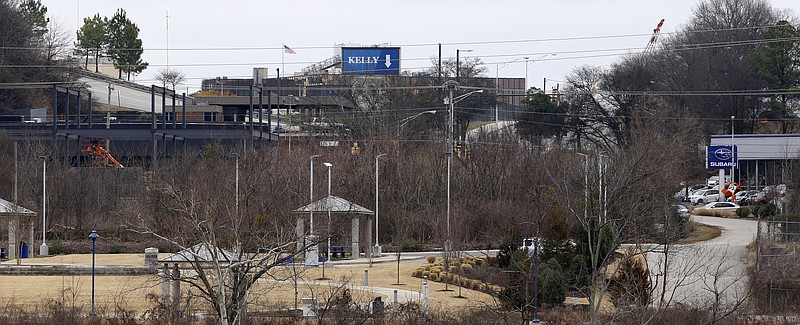After another round of questions Tuesday, the Chattanooga City Council appears to be closer to going forward with extending M.L. King Boulevard to the Tennessee River using a tax incentive for the developer.
Yes, money generated from the tax break will be used only to construct the road, a broad, landscaped entry to the Blue Goose Trailhead at the Tennessee Riverpark, and for improvements to another city street near the riverfront.
No, none of it will be used for the $50 million third phase of Cameron Harbor, the upscale development that includes the properties included in the tax incentive.
Neither will $500,000 of the tax increment financing (TIF) revenue be used to subsidize apartment rentals at the Cameron Harbor development for workforce housing.
Those promises came from Deputy Economic Development Administrator Charita Allen and Jermaine Freeman, director of small business programs in the development department, at a council agenda session. The council is scheduled to vote next week whether to accept an economic impact plan and allow Mayor Andy Berke to sign off on the tax plan. The Hamilton County Commission also must sign off on a county property tax incentive for the TIF to go forward.
Councilman Erskine Oglesby Jr., chairman of the council's economic development committee, thanked Allen, Freeman and the other city staff who worked on the proposal for "a phenomenal job" and their "passion and dedication" to answering questions about the proposal.
The TIF will raise $3.5 million for the road and be repaid over 15 years with money that would have gone for property taxes on four buildings - a restaurant, a medical office, a mixed-use building and an apartment building - in the Cameron Harbor development. The 15-year payout, including interest, is $5.2 million.
That's at least $1.3 million less than the original TIF plan, and it comes from eliminating the workforce housing subsidy. Council members opposed the subsidy, which the administration pushed as a way to help moderate-income, working families be able to afford to live downtown.
In the end, the benefit just wasn't affordable, Freeman told council members. Because the city and Hamilton County would keep some of the money for school taxes and debt service, developer Evergreen Realty wouldn't have enough left to repay the $4.5 million TIF construction loan in 15 years.
The amended plan, introduced Monday at the Chattanooga Industrial Development Board meeting, triggered multiple questions from members of local watchdog group Accountability for Taxpayer Money. Those members, led by retired city planner Helen Burns Sharp, say the road extension doesn't fit the city's rules for TIF projects and they would prefer another funding source.
Allen told council members Tuesday the city had ruled out other options, such as dipping into the city's Alstom settlement, issuing a bond, or using money from the 21st Century Waterfront fund or hotel-motel taxes.
"Without the TIF the developer will not be able to finance the changes we requested" to build the M.L. King extension, she said.
Councilwoman Demetrus Coonrod asked about removing the workforce housing component and said the city needs to be looking at more ways to make housing affordable for all, including low-income and minority people.
Councilman Russell Gilbert, who calls the inability to use 21st Century Waterfront funds "one of my pet peeves," nonetheless praised the project for keeping alive community history. Legendary Chattanoogan Bessie Smith used to sing in nightspots in the Blue Goose Hollow area, which was a black community before it was uprooted by industrialization.
After the council's voting session Tuesday night, Councilman Darrin Ledford said he had only a few questions left before the scheduled TIF vote next week.
But Sharp and local resident Franklin McCallie renewed their objections, asking the council to hold out for a different form of financing.
Contact staff writer Judy Walton at jwalton@timesfreepress.com or 423-757-6416.

